#this is knowledge and immortality!!!
Explore tagged Tumblr posts
Text
you should all be donating like ten dollars a month to wikipedia, we have more knowledge at our fingers than mankind has ever before possessed and it's provided by weird little monks who sit in front of their computers and do it for free because they love the history of municipal zoning law so much.
#it was for this that prometheus was doomed and atlas was made to bear the weight of the earth!!!#this is knowledge and immortality!!!#and there are no ads!#give them the cost of a latte!
59 notes
·
View notes
Text
oh to be immortal and be able to consume every piece of knowledge and literature ever
#literature#i want to be immortal#books#knowledge#dark academia#tsh#the secret history#iwwv#if we were villains#babel rf kuang
2K notes
·
View notes
Text
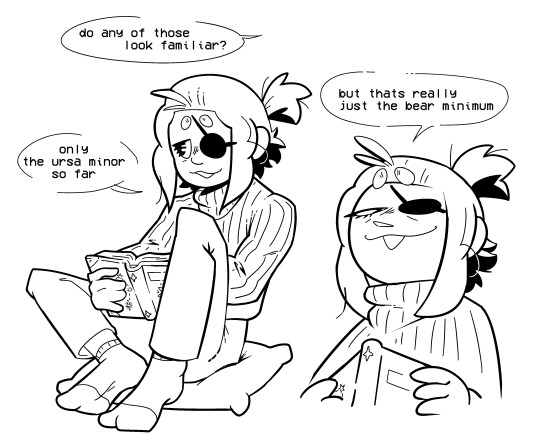
funnyjokespunperson
#cozy-comfy reading a book recovering <3#vulnerability? sorry all they got is puns#love them for it tbh so real for that#i imagine this being somewhen post-game so#isat spoilers#sorry but i do not believe that Vaugarde or really any other place has no constellations at all#they are so usefull! for navigation or for calendar keeping!#so yeah now there Are constellations they are just niche knowledge for like sailing or for understanding how the calendar formed#i guess there is also specifically ursa minor what a coincidence#did you know that there are myths based on how constellations behave through out the year?#scorpio and orion are never seen on the sky at the same time and theres a myth about how the scorpion killed him#but he was immortalized on the night sky (the scorpion also got immortalized because fuck orion)#rant over have a nice day#isat#in stars and time#isat siffrin#my art
2K notes
·
View notes
Text
my hot pjo take is that Jason isn't a second Percy, Jason is a second Annabeth. Jason is just if Annabeth was a guy and also a Big 3 kid.
#pjo#riordanverse#jason grace#annabeth chase#CAUSE LIKE. THINK ABOUT IT: older sister is Thalia. raised at camp from an unusually young age for demigods.#adoptive parent figure is the immortal teacher of said camp. looking to prove themself. extremely knowledgeable#becomes BFFs with the spunky new kid who's a little bit of an outcast and comes from a troubled home#ends up co-leading camp alongside them. likes architecture and history and very passionate about fairness and law and such#but also is kind of a notorious rulebreaker but never gets in trouble for it#literally ends up put in charge of building stuff for the gods!!!!!!#THEY EVEN LOOK ALIKE. blond/e hair tan skin and stormy eyes!!!!!#Thalia lost her brother and then found Annabeth and went ''oh look. Jason 2. yeah this will fill the void in my heart just fine''#anyways this does make Jercy VERY funny. Percy looking between Annabeth and Jason and going ''mhm. mhm. yeah.''#anyways if you are a jason lover but annabeth hater or vice versa. look inside yourself...... you may just find. two. of the same character
992 notes
·
View notes
Text
Immortality of the Soul is spooky shit 🤔
#pay attention#educate yourselves#educate yourself#knowledge is power#reeducate yourself#reeducate yourselves#think about it#think for yourselves#think for yourself#do your homework#do some research#do your own research#ask yourself questions#question everything#immortality#human immortality#stranger than fiction#stranger things#spooky stuff
189 notes
·
View notes
Text
So, one of the most interesting things that's come from my recent exercises in writing the Olympians as young deities is all of the very fun and somewhat painful conversations that come from the young deities acquiring and consequently settling into their domains.
Apollo and Artemis especially have been really fascinating under the microscope. They start off identically, with extremely similar interests and similar domains over the hunt and wilderness. They spend their days under the stars and foraging for fruit and dancing and singing in the fields, two rustic god-children exploring and learning together. Then Apollo goes off on his own to slay Python.
Now, a lot of things change when Apollo kills Python. That is the act which transforms the bow from a tool of survival and sport to an instrument of murder, bloodshed and ultimately war. It is Apollo's first act of wrath which separates him from Artemis - both spiritually because she has not yet shed blood herself as a goddess and physically because it leads to his exile. Most importantly however, the slaying of Python is the act that grants Apollo his knowledge.
If violence is what first separates Apollo from Artemis then it is knowledge which keeps them apart.
This can refer to a lot of things; that Artemis continued to be at home with the wild beasts of the forests and mountains while Apollo grew to prefer the domesticated sheep and cattle, that Artemis continued to avoid mortals while Apollo grew to know their ways and endeavoured to teach them more. The point that has been the most interesting to me however has been Artemis, who remains free of slaughter, and thus remains pure and Apollo, who becomes acutely and entirely too aware of it, and thus must be constantly purified.
Apollo's infatuation with medicine specifically is the place where this becomes most apparent. When he leaves for his exile to travel as a mortal, without nectar or ambrosia, without power, Apollo is without the privileges of the divine for the very first time. He sweats, he smells, he grows weary when he travels, he grows hungry and thirsty. He experiences fatigue and nausea, the fever of sickness, the chill of infection, the delirium of poison. The blood Apollo shed does not only make him impure spiritually, it strips him of the purity of his birth and station. Likewise, medicine is not a divine practice. What use do the unkillable immortals have for something as finicky as medicine when they have nectar and ambrosia? Apollo however, knows of the pains of the flesh and the suffering of the mortal coil. He pursues medicine in all its horrors and difficulties because of the knowledge he gained with blood.
Artemis then, cannot understand the medical Apollo. When her brother returns possessed by this spectre of ill-gained knowledge, she does not recognise him. Who is this boy who scores the deer and studies the shape of their intestines before he cooks them? What good is there in rescuing a chick with a broken wing? The Apollo-of-the-Wild in her memories would have done the correct thing and left the thing for dead - let the forest take what is its due. Who is this Apollo whose hands are always stained to the wrist in the blood and gore of the living? What is his fascination with the mechanics of mortal bodies? Artemis does not know and Apollo does not tell her.
That has, by far, been my favourite effect of the whole Python watershed moment to explore recently.
#ginger rambles#apollo#artemis#greek mythology#pursuing daybreak posting#There are actually quite a few parallels with the Christian Adam and Eve in this whole exploration of Apollo and Artemis pre and post Pytho#Blood-soaked Apollo - much like Apollo of the Ashes - is one of my favourites because it always leads to such fascinating questions#Like it's clear that Apollo did not shy away from butchery and slaughter and if things like hepatoscopy is any indication#he needed to do these things frequently in order to keep sharp#Medicine is its own beast tbh#Including the differences between mortal and immortal medicine#Yes Asclepius would eventually come to surpass him but Apollo was the pioneer and the study of medicine#of studying diseases and creating cures for them is not a pretty thing#Combined with Apollo's prophecy I imagine he had his hands full#Though Zeus would've taught him a few things no doubt considering how vast his own knowledge is#God I love Apollo's wall of horrors actually#Like fr if you are squeamish do not go into this man's room you will cry and throw up though not necessarily in that order#cw gore mention#cw blood
141 notes
·
View notes
Text
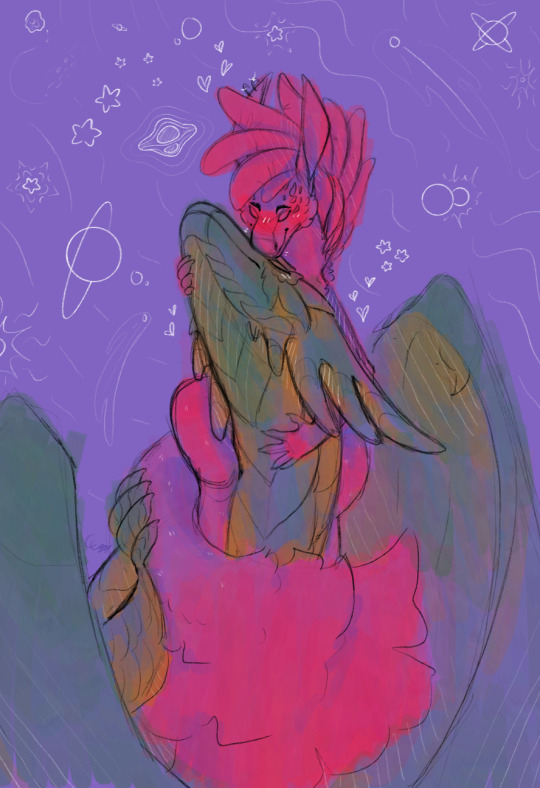
wifies
#mwah mwah mwah mwah mwah Them <3#i like to think that rogers uses jade as her personal jungle gym#what is big wife for if not Climbing and Perching#scribble garnish#not-fish <3#oc#original character#dragon#dragons#they are Thee immortal pairing to me#living in the past and future / living in the present#plagued by the knowledge that she will always leave / secure in the resolve that she will always come back#eternal memory / will forget and remember a thousand times over
246 notes
·
View notes
Text
Does anyone think about how much the Last Dragonborn changes as their quest goes on?
Not like, character building or learning experiences.
I'm talking about having the ability to eat immortal souls and having to just live with that.
A mortal vessel given the gift (curse) of killing and consuming other immortal beings; personally made by Auriel Himself. What does that feel like to gain the knowledge of eons just shoved right into your brain, willing or not. To have experiences and understandings no one else will ever match with you.
Your only similar peers are your enemies. Destined to fight or dominate all of them as The Last Dragonborn.
What does it feel like to make room in yourself for other souls so much larger than your small, mortal, body?
What does it feel like to be a black hole that will infinitely take and take and take and add more and more to your being.
Are you yourself anymore? Do those dragon souls persist inside you?
Are you even mortal anymore?
#shady speak#skyrim#tes#i have big thoughts and big feelings about dragon souls and their immortal properties#because there is no way that a dragon soul is consumed and just becomes free knowledge in the Dragonborn to use as skill points for shouts#there has to be other consequences to eating a soul that was made first personally by Auriel#for good or for ill
97 notes
·
View notes
Text
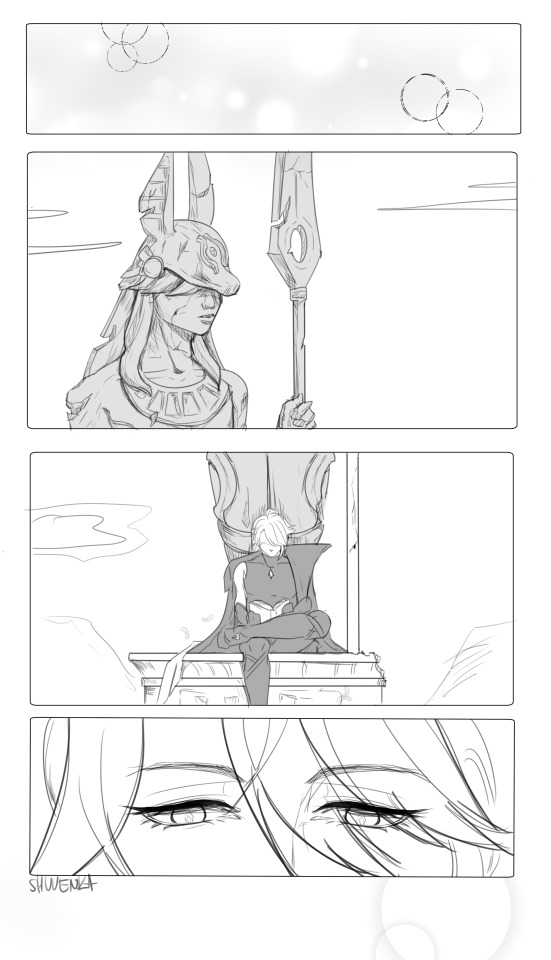
It's been awhile, couple hundred of years.
Give or take.
It's not that bad, Cyno.
Just a bit of ache. A bit of yearning.
Ah, and missing you for all of the eternal life I was cursed with.
Selfish desires of the heart that was once moved.
#haino#cytham#alhaitham x cyno#cyno#alhaitham#cyhaino#immortal alhaitam and cyno who is long gone#this is one of the au's that are rattling in my brain#alhaitham as history keeper and immortal being#never minding his immortality#just gaining knowledge and observing and noting down#until he meets cyno#cyno is a warrior#a general that is a vessel for a god#challeges him and fascinates him#and alhaitham for the first time becomes part of the history he used only to observe#because cyno fights in the war because of his loyality and conviction#suddenly theres so much meaning in small things that alhaitham never discovered before#so much meaning in life#but human life is short and ficle#and for cyno it also ends#neither peacefully nor of old age#he dies by blade and blood spilling#but he is remembered by his kin#they build him a statue#his name will be remembered in books#as for alhaitham - he will continue wandering history#missing him deeply#maybe immortality is in fact a curse
137 notes
·
View notes
Text
Giratina's Temple and the Celestica Ruins
aka Giratina/platinum clan theory is back (also sorry for using mspaint lmao)
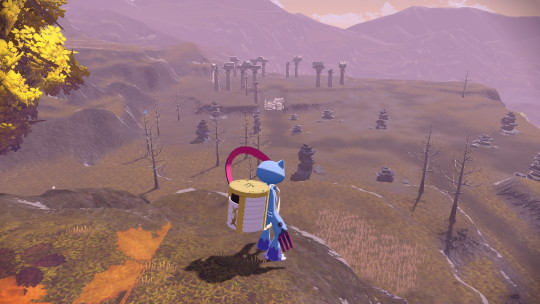
So we all know about the Shrouded Ruins, yeah?
(This is the only spoiler warning for Pokemon Legends: Arceus you're gonna get)
Spooky. Ever-cloaked in mists and mystery, surrounded by black-stoned cairns like graves and home to the giant Odd Keystone that once (?) housed 108 souls. Very ghost-centric.
Well what if I told you it was a temple?
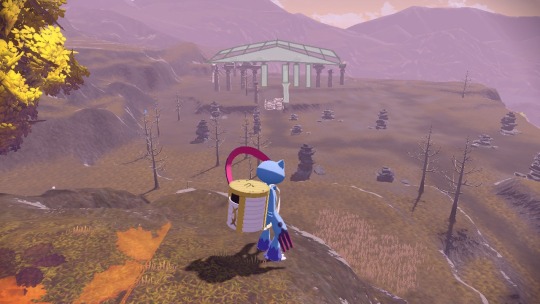
Greco-roman temples (and, problematic or otherwise the celestica are absolutely greco-roman coded) are constructed relatively uniformly, with an outer later of columns holding up the roof and an inner layer holding up an internal structure, providing additional support, ect.

We have a perfect in-game model to project from, too, in the Temple of Sinnoh (pre-explosion). You can see that some of the smaller columns are sometimes decorative - likely they held up torches or, in the case of the two nearest the 'altar,' offerings

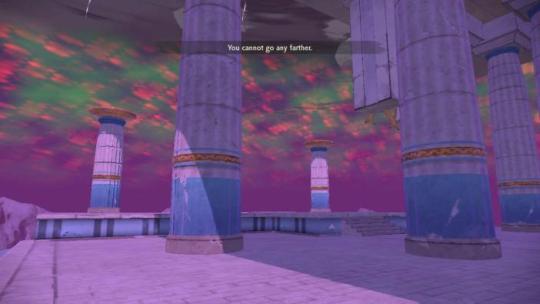
So knowing that style and having the remaining structures we do see in-game, we can approximate a lay out of what the building may have looked like.
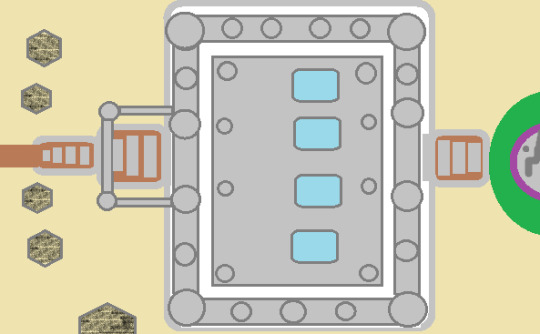

What makes this a temple, however, is more open to interpretation. My evidence to support that it is is actually the blue-tinged pedestals seen within the outline of the building - the place(s) of honor in any temple. Irl, the inner structure - the cella - was often fully-walled in, though sometimes this was constructed via wood and other materials that don't withstand time.

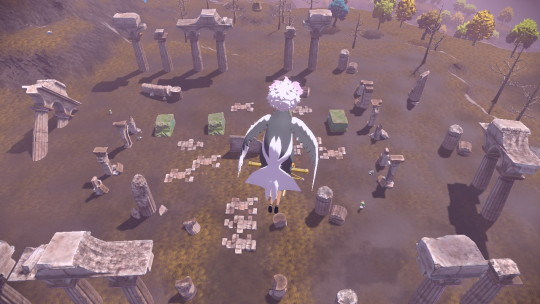
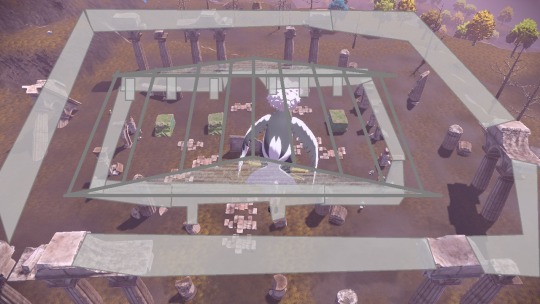
Now, ENORMOUS shout-out to pokemaniacchris and the incredible Crimson Mirelands Archeological Survey Project for a really detailed, in-character breakdown of the ruins structures throughout the mirelands. I can only assume the 'surveyors' hadn't reached Mt. Coronet yet in their explorations.
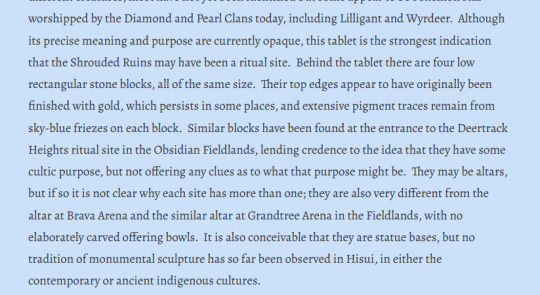
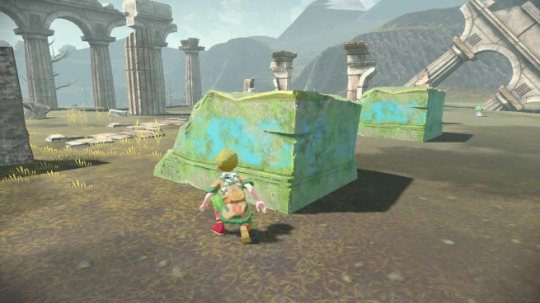
Pedestals like these (at least superficially similar) are found beneath dozens of statues around Mt. Coronet, including beneath Giratina, Palkia and Dialga in the Sacred Plaza area. Now, I know I'm supposed to be claiming that this is a temple to Giratina, but if we work on the assumption that the four pedestals corollate with Giratina, Palkia, Dialga, and Arceus, a new conclusion can, perhaps, be drawn:
That whoever built this temple saw all four of them on the same 'level' of power or -- and this is my hc taking over -- if the statues were placed in a certain orientation (see below) that they saw Arceus and Giratina on equal footing, with Dialga and Palkia one rank below.
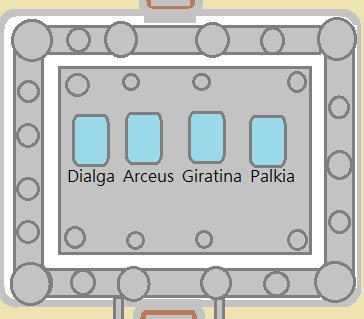
And there is, imo, more evidence to support this disruption of the 'creation trio' into two pairs on equal footing, found in the Celestica Ruins! So, among the structures there are two notable, circular buildings that the Greeks also utilized, called tholoi (plural). Irl, tholoi were a mix of secular-use and small-scale temples, and seeing as these two are small (maybe 10ft across inside?) I would maintain the claim that they're small temples.
And they align/mirror each other just as the statues of Palkia and Dialga do.

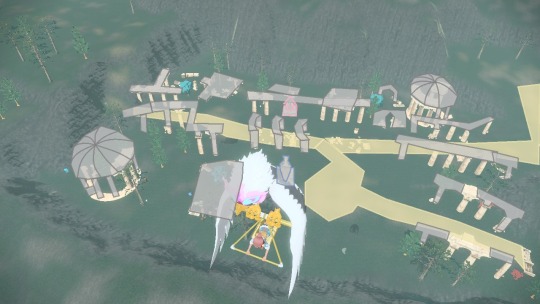
This part becomes pure conjecture, but I like to think the smaller structures in the ruins might be other small-scale temples for the various mythicals, honoring each much as the Greeks honored a pantheon.
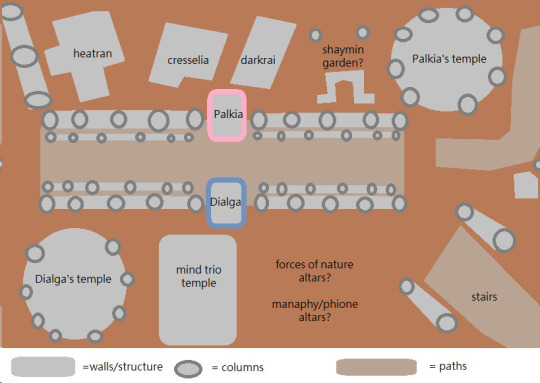
Lastly, the CMASP describes the "Gapejaw Bog Complex" as being potentially an entire agora all its own and I can't agree more. Such evidence would support the idea of there being two groups of Celestica (Note: Not the Clans.)


I actually found myself wondering if the mirelands weren't always quite so swampy, and instead flooded at some point in the past with the depressions around Gapejaw - left by housing foundations - filled in with swamp water.
At the end of the day, I think there's a lot of evidence that the Celestica revered Giratina as well as Arceus, Dialga and Palkia - at least early on. Something happened to cause this schism, and the Old Verses/Plate inscriptions point to an outburst of rage from Giratina -- though, in "pick a god (and pray)" I actually argue it was mispercieved on the part of the Celestica and this misperception is what caused Arceus to despair and withdraw.
Open to discussion!! fellow nerds please interact!!
#pla#pokemon legends arceus#celestica#celestica people#pokemon lore#giratina#arceus#volo#i also think there's a correlation between the ancient hero story's bolts of rage and alphas/hisuian pokemon aggression#specifically my internal timeline is that the schism predates everything purely on the secular/human level#arceus then empowered the noble pokemons' ancestors and fought the hero and believed humans were worthy of his blessing until the celestica#blamed giratina for the rage lightning and shattered the statue and maybe even drove the gira sect out#this dismayed arceus and it withdrew leaving the rage to fade but still linger and make hisui inhospitable#the celestica left (of their own volition imo) to seek out arceus and other knowledge and the clans came after#the clans saw only two statues (palkia and dialga) and picked sides but still upheld the tradition honoring the nobles#i imagine cogita being direct celestica (immortal or otherwise) and volo being gira clan descended or otherwise descended from the diaspora#the celestica then went to sinjoh/johto and so on and so forth#long post#reference
336 notes
·
View notes
Text
mmm thinking about an au where Narinder runs away after being defeated and eventually finds himself being taken in by a kind soul in a distant village beyond the borders of the Old Faith. He begins to learn how to just... be, after a rocky start. Slowly easing into village life, taking over the kind person's role once they get too old to continue working (Narinder quickly realizing he himself isn't aging) and somehow accidentally fitting himself into the role of this person's son.
Years pass by and he's fully settled as a member of this godless village, unaware of the power vacuum left by the crowns and the war the Lamb (& Co, he's unaware that his siblings have been brought back) are fighting, watching the generations being born and aging. Maybe a whole generation has come and gone in the time he's been there, and over those ~100 years he becomes a pseudo-leader/protector for them.
Maybe a stranger comes to the village one day. A stranger from outside. Narinder was once a stranger from outside too, and like the kind soul who took him in he does the same, and something... starts between them. Something warm, something he's never felt before. Painfully aware of his own mortality, yet.... a family sounds nice. He's watched everyone around him start their own, he's even helped widowed parents and orphaned children....
So he starts a family. And they're happy.
Until they're not.
The power struggle from the land of the old faith spills over their borders, wannabe gods looking to expand their power, and in the dead of night Narinder's peaceful little village is attacked.
so much is lost- not a kit, thankfully, Narinder protects them with everything he has, and by now he has discovered he can still use magic so protect them he does. But the village is under attack and Narinder's partner is among those who are lost.
He lashes out with his magic, essentially rotting every heretic in the village alive in his grief, and afterwards they rebuild with a few dozen new graves, well cared for, with Narinder pretty solidly stepping into the role of leader. He doesn't introduce the idea of gods to these people- they're his people now, and they don't need gods. He can take care of them himself, god or not.
Those who are capable of magic, he teaches to use it. Those who are not, he teaches to use weapons and runes. He won't let the outside world harm them again.
Fast forward ~15 years, the village is thriving and the people are happy. His kits are teens/young adults now and his people are capable enough to defend themselves, so he's started joining hunting parties and trade groups, interacting with other villages outside of the Old Faith lands (they're spread apart, and Narinder's village is at this point the most prosperous... due to magic reasons, not that Narinder will reveal this). He very, very much refuses to go anywhere near the Old Faith's lands, and has in no uncertain terms forbidden his kits from even approaching the border.
No one knows who he really is. Unfortunately, skeletons don't stay in their graves when the Old Faith is involved.
Narinder is away with a trade group when the Lamb and the Bishops, who are searching for a rogue heretic faith that attacked their cult, stumble upon the village. It's the only one for miles, having been days since they've seen another village (Lamb laments the fact they can't just teleport out here, since there's no warp stones set up out here). The villagers are cautious but friendly- very clearly not warriors, but clearly not about to lie down and let themselves be harmed.
They talk amongst themselves, knowing the people out here don't speak their language, when someone greets them in their language. It's Narinder's oldest kit, a polite thing who definitely plays the rules on their lines; "Father says we cannot go into the Old Faith lands but he said nothing about inviting them to dinner." Ofc this kit has no idea who these people are, and they have no idea who she is, but she greets them nicely and lets them know her father is the village's leader and they cannot offer anything more than water for the road but there is room at their table if they would like to join them.
The Bishops and Lamb are tired and have been on the move for weeks now, trying to hunt down the rogue heretics who managed to escape, and honestly, dinner and a place to safely sit sounds nice, and it's not like any of them can actually be killed if things go south (Lamb would just bring them back and they know it). So they agree to stay.
And then Narinder returns. Impromptu family reunion :)
#cult of the lamb#cotl au#just thinking of Narinder starting a new life away from the cult and finding his place among the godless lands#and using his inherent magic and the knowledge of thousands of years of life to help this struggling village#and just becoming one of them....#and then when he meets the Lamb again it's as as close to an equal as an immortal can be with a god#the god leading their cult and the leader of his godless village....#Narinder with his new family....
48 notes
·
View notes
Text
Vanitas infodumping about vampires will forever live rent free in my head
#robin fixates#I’m specifically referring to when he explains why getting his blood drank felt good to Jeanne#but like#I love the idea that he just has all kinds of vampire knowledge stored up there#and is Just waiting for the chance to SPILL#let my boy INFODUMP#I’m#unreasonably upset about how little I understand the vampire rules on the show#all vampire media has slightly different rules#sometimes#vampires are born sometimes they’re made#sometimes they age sometimes they don’t sometimes they can deage usually through drinking blood#even common rules like sunlight immortality and garlic can be iffy#like clearly Vanitas vampires have no issue with sunlight#do they age? Chloé didn’t age but Poe Knockoff (idr his name) did#Noé is 19- will he become old man? Will he die of natural causes? Will he stay 19-ish forever?#I haven’t read the manga so I don’t know#crosses. yay or nay?#they don’t NEED to drink blood but they like to#we see Noé break into a place so they don’t need to be invited in#ugh#my life will be complete when Vanitas gets to infodump about vampirss#vanitas no carte#the case study of vanitas
23 notes
·
View notes
Note
Julia’s willing to accept the life as an immortal circus dweller. Of course that will depend on the contract and if the conditions can change. Though I guess this means she’ll have to accept that she will have to say goodbye to her dad forever. Poor guy. He at least deserves to know that his daughter is okay. I just hope he’ll accept that Julia loves an Ak’Kon and that he won’t be able to have any grandchildren he’ll never get to meet.
Did not read this week’s episode yet oops but… is Julia really ready to accept the weight of immortality? Julia’s a lot luckier than most in the sense that her best friend and her love interest are there with her (rip finnegan), and you can’t deny that the circus opens up opportunities and offers a happy life that the members might not have gotten otherwise, but I don’t think it could truly be called living. Life at its core is change, and without death, there is no life. Yes the circus changes locations and even changed themes, but it seems most of the circus members have stopped trying to think or work towards something. They’re content with everything staying the same, and they’ll make sure it stays that way (looking at you, Dotty). Unlike Sahed and Rainah, many don’t seem to understand the gravity of the situation (especially Kamille, but she’s young). What the circus members have signed themselves to is an eternity of a happy, ignorant stagnation—until the moment they decide they cannot take it anymore.
#at least they have a way out of their contract#being an immortal being is genuinely terrifying to me#eventually you begin losing your humanity#because what is being human without the knowledge that at any given second you can die#marionetta#webtoon#asks
20 notes
·
View notes
Text



#la by night#vampire the masquerade#vtm#laby#the CHEMISTRY between these two#fiona ready to rip anyone to shreds from day one for this woman#and i respect her for it#fiona is many things and gay is several of them#messy being like five more#meaning this dynamic way perfecttt for her#and chloe just there taking it all it#them both playing eachother like a fiddle and loving every second of it#the homoeritic tension of immortality and knowledge#the fact that chloe would have made such a fantastic nostferatu with all of her information seeking too#chloe was tired of being scared long ago#and then sees this power hot woman#and then looks at jasper devastated#but he is still scared#and she isnt
40 notes
·
View notes
Text
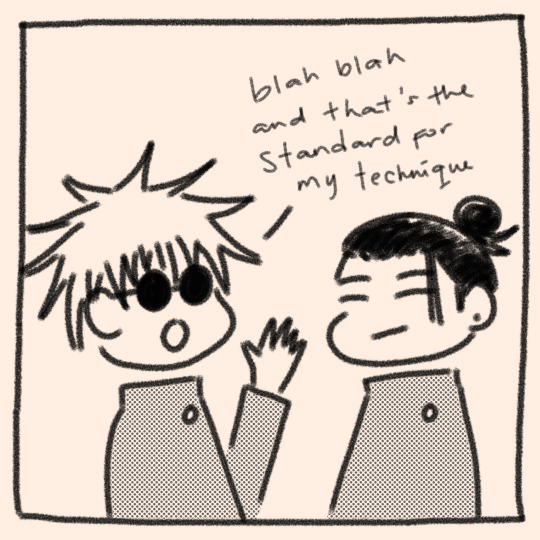


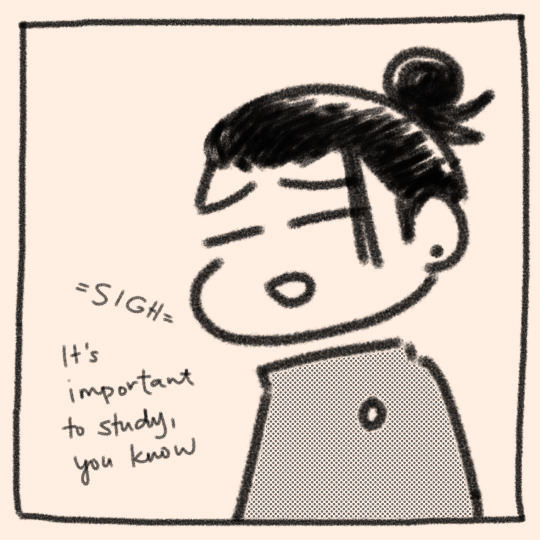
HC: It's Suguru who knows Achilles and the Tortoise, not Satoru.
A silly collab with @cursorcerer! It's fun to play with these gays
specifically from this scene

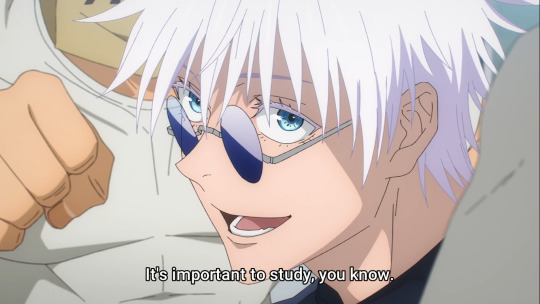
#he would not effing do that#there's no way satoru would study#he doesn't even know that resetting thing with Tengen aka the most important sorcerer in the jujutsu world or something#does he even know Tengen is immortal??#'it's important to study' is obviously a suguru line#satoru only learn through secondhand knowledge from suguru#it's canon#see ep 25 aka s2ep1 or vol 8 ch 66#jujutsu kaisen#satosugu#gojo satoru#geto suguru#jjk fanart#jjk art#jjk season 2#jjk s2#jujutsu kaisen season 2#jjk#lulla-bee#lulla-bee draws#they only have one brain cell and it's suguru's
295 notes
·
View notes
Text
Little idle thought I've been having recently but I think Cyparissus' story is very important for characterising Apollo and Apollo's love. It's so easy to think of love and loss as two ends of a spectrum, likewise, so often, death is seen as an ultimate and tragic end in love stories - something final and inescapably tragic, the only force that halts love by separating the lovers.
Cyparissus' story is... not that. Yes, the deer dies and one can conclude then that death is once more at the heart of separating two lovers, but I think Cyparissus specifically requesting to die, specifically begging Apollo to let him grieve forever even after Apollo has done his best to help Cyparissus move on from the accident and Apollo letting him is a powerful thing.
Because Apollo not only puts Cyparissus' wishes over his own, he's also able to see past his own building grief to immortalise Cyparissus in such a way that both grants him his wish and allows other people to glorify Cyparissus as well! And I think such a beautiful thing is something criminally overlooked!
It's become something of a joke that 'all Apollo's lovers turn into plants' but from a functional perspective, flowers are the most brilliant way to keep the spirit of a beloved thing alive. Flowers are like stars - as long as there are humans, humans will always contemplate the nature of flowers and as the god of poetry and song, Apollo creating opportunities for his beloved mortals to be remembered eternally even if they never seized glory in the traditional way is such an intimate and beautiful thing. Even then, Cyparissus is elevated to a similar status as Daphne with Apollo's actions - not merely a plant or flower but one that specifically symbolises him, one that is extremely fragrant and beloved by him. Just as Daphne's laurels were synonymous with glory and victory, Cyparissus' cypress became a emblematic of grief and remembrance. Even today, thousands of years later, people still view cypress trees as mourning trees and plant them in cemeteries and use the ash in incense burnt in remembrance of others. How's that for Apollo keeping his word.
#ginger rambles#I think we should talk more about how Apollo's ability to immortalise people into those coveted halls of memory is so often done out of love#and how it is the closest many of his beloved mortals will ever get to godhood but even that is leagues better than the hundreds of warriors#and kings and scholars who worked for glory their whole lives only to be forgotten and lost among the sea of time and history#And then you have Daphne and Hyacinthus and Coronis Cyparissus and Evadne even Branchus whose affair is marked with the sprawling arms#or trees and forests - who would ever say they were unloved?#Daphne is eternally interesting to me btw because like idk what anyone says it doesn't matter that Apollo was hexed to love her by Eros#Even if what Apollo felt wasn't 'true' love he did feel true regret and made real and true penitence. Apollo literally spent#the rest of his immortal days wearing Daphne's laurels and making her his symbol until she became so synonymous with gods and glory that she#became symbolic of the gods and their kings themselves! Like!! It's obscure knowledge now that gods like Zeus and Poseidon had their own#preferred plants to wear as wreath crowns because laurel-crown is so iconic as the Look of a greek god#how could you not see that as love? even if it's retroactive? Apollo worked so hard to give her the glory he robbed from her and people#still choose to focus on the chase + transformation and “oh well Apollo and Daphne wasn't a love story it was assault/a curse!!”#my brother in Christ it counted to Apollo so it counts to me too#anyway just something I've been thinking about#apollo#cyparissus#daphne#greek mythology#ginger chats about greek myths
24 notes
·
View notes